‘The Great Shout’ backs flooded Queensland communities
Queenslanders are being urged to raise a glass and much-needed funds for one of the state’s worst flood disasters.
Great Northern today launches The Great Shout. It will see the brewer partner with around 250 Queensland pubs and clubs to help flood victims in the state’s centre and west by raising at least $200,000, with expectations of more.
Fundraisers will be held on May 2- 5 over the NRL’s Magic Round using up to 500 kegs of Super Crisp donated by Great Northern. Fund will go direct to Rural Aid.
Many towns are still cut off and, with a massive clean-up ahead, Central and Western Queenslanders are now counting the cost and severity of recent record-breaking floods.
Quilpie Mayor, Ben Hall said the devastation facing his region, in Queensland’s south-west, and seven other Queensland shires, was immense.
“The March flood is the most devastating this region has ever experienced and any help we can get would be welcomed,” Mr Hall said.
He said the size and scale was difficult to comprehend with farms, homes and entire towns in ruins across an area four times the size of the United Kingdom.
In response, Great Northern has launched The Great Shout, a “have a beer for the bush” campaign.
The funds will go directly to Great Northern’s charity partner Rural Aid, which will use the money to deliver hay to starving livestock, provide direct financial relief and fund ongoing mental health support through its dedicated counselling team.
Farmers have welcomed the help, including Lousie Hoch, lifelong Quilpie station owner and mother of four who has lost tens of thousands of metres of fencing, vital earthworks, on-farm transport routes and up to 3,500 head of stock.
“Flooding in the Channel Country happens, but nothing like this,” Ms Hoch said.
“It was so high so fast and more ferocious than I have ever seen it. It just cleared everything in its path.”
Rural Aid CEO John Warlters said that while times are tough, Aussie farmers are tougher, and with a bit of help they will get back on their feet.
“Recovery from a disaster of this scale won’t be quick—many farmers face months of ongoing hardship. With the backing of Great Northern, Rural Aid is committed to standing by our rural communities every step of the way.”
Ian Giles from Great Northern Brewing Co said that in the worst of times, mateship always shines through.
“Mates helping mates is the Queensland way.
“So, shout a few cold ones, and raise a glass over the May long weekend to our hardworking farmers and communities who have it pretty rough at the moment.”
A full list of participating pubs and clubs, along with how information on how to donate if you can’t make it to a venue, will be progressively published on
https://the-great-shout.ruralaid.org.au/ in coming days.
About Rural Aid:
Rural Aid is Australia’s leading rural charity, dedicated to providing practical support and vital services to farmers and rural communities. Since its establishment in 2015, the charity has been a lifeline during times of crisis, delivering essential services such as mental health support, hay, domestic water, and community engagement. As the organisation celebrates 10 years of service, it continues to partner with farmers to navigate challenges, recover from hardship, and build stronger, more resilient futures, shaping a brighter future for rural Australia.
For media inquiries, please contact:
Daniel Brown
Media and Communications Officer
0447 116 757
daniel.brown@ruralaid.org.au





